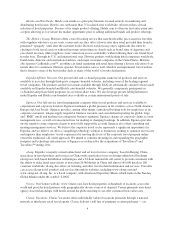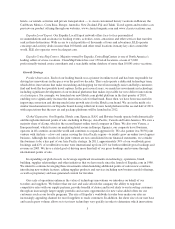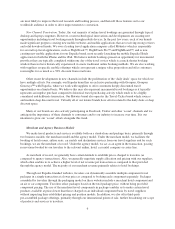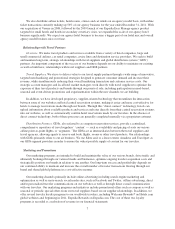Expedia 2011 Annual Report Download - page 18
Download and view the complete annual report
Please find page 18 of the 2011 Expedia annual report below. You can navigate through the pages in the report by either clicking on the pages listed below, or by using the keyword search tool below to find specific information within the annual report.internet media properties, including TripAdvisor, and search engines. Pricing and operating dynamics for these
traffic sources can experience rapid change, both technically and competitively. Moreover, a search engine could,
for competitive or other purposes, alter its search algorithms or results causing a website to place lower in search
query results. If a major search engine changes its algorithms in a manner that negatively affects the search
engine ranking, paid or unpaid, of our websites or that of our third-party distribution partners, or if competitive
dynamics impact the costs or effectiveness of search engine optimization, search engine marketing or other
traffic-generating arrangements in a negative manner, our business and financial performance would be adversely
affected, potentially to a material extent.
Our international operations involve additional risks and our exposure to these risks will increase as
our business expands globally.
We operate in a number of jurisdictions outside of the United States and intend to continue to expand our
international presence. To achieve widespread acceptance as we enter countries and markets that are new to us,
we must continue to tailor our services and business model to the unique circumstances of such countries and
markets, which can be difficult, costly and divert management and personnel resources. Our failure to adapt our
practices and models effectively to the traveler and supplier preferences of each country into which we expand
could slow our international growth.
We are subject to particular risks and uncertainties relating to our operations in China, which are primarily
through eLong, an online transactional travel business. The success of this business and of any future investments
we make in China is subject to risks and uncertainties regarding the application, development and interpretation
of China’s laws and regulations. Significant uncertainties exist regarding the interpretation and enforcement of
Chinese laws and regulations including permits and license requirements, and such uncertainties could limit the
available legal protections relating to our investments. Moreover, we cannot predict the effect of future
developments in China’s legal system, particularly with respect to the travel industry, the internet and online
commerce, media, foreign investment, taxation, labor, and currency exchange and regulation, including the
introduction of new laws, changes to existing laws or the interpretation or enforcement of current or future laws
and regulations. In addition, the laws and regulations of China restrict foreign investment in areas including
air-ticketing, travel agency, internet content provision, mobile communication and related businesses. Although
we have established effective control through a series of agreements between the companies in which our
Chinese investments are held and their affiliated Chinese entities, future developments in the interpretation or
enforcement of Chinese laws and regulations or a dispute relating to these agreements could restrict our ability to
operate or restructure these entities or to engage in strategic transactions. Capitalization of our Chinese entities is
also subject to extensive government oversight and regulation and there can be no assurance that we can provide
adequate financing for these entities. Finally, China does not have treaties with the United States or most other
western countries providing for the reciprocal recognition and enforcement of judgments of courts. As a result,
court judgments obtained in jurisdictions with which China does not have treaties on reciprocal recognition of
judgment may be difficult or impossible to enforce in China.
Other risks we face as a result of our international operations include:
• Political instability;
• Threatened or actual acts of terrorism;
• Regulatory requirements, including the Foreign Corrupt Practices Act and U.K. Bribery Act, data
privacy requirements, labor laws and anti-competition regulations;
• Our ability to comply with additional U.S. laws applicable to U.S. companies operating internationally
as well as local laws and regulations;
• Diminished ability to legally enforce our contractual rights;
• Increased risk and limits on our ability to enforce intellectual property rights;
14
























